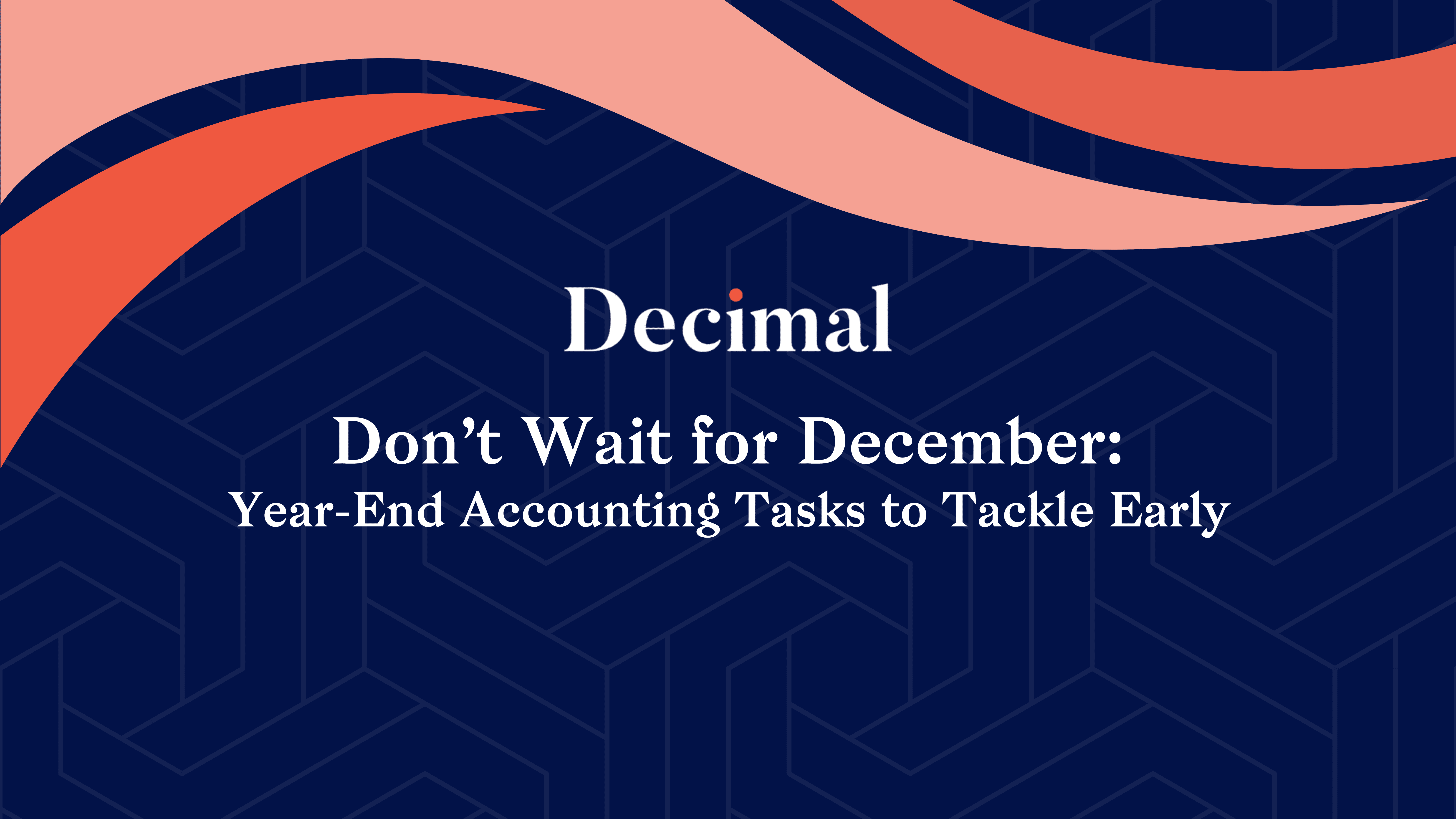Don’t Wait for December: Year-End Accounting Tasks to Tackle Early
If you’ve ever spent the last weeks of December frantically chasing receipts, reconciling accounts, and double-checking spreadsheets, you’re not alone. Year-end accounting can sneak up on even the most organized businesses. But here’s the good news — it doesn’t have to be a last-minute scramble. Getting a head start on your year-end accounting doesn’t just save time — it saves stress, improves accuracy, and gives you a clear picture of your business health before the new year begins. Whether you’re a founder, finance leader, or small business owner, tackling a few tasks early can make your December (and January!) a lot smoother.
Why Starting Early Matters
Think of early accounting prep as spring cleaning for your books. You’re setting up your financials to tell a clear, accurate story — one that helps you make smarter decisions, plan budgets, and file taxes without the panic. Starting early means you can:
- 🧾 Catch errors before they snowball – Misclassifications or missed transactions are easier to fix now than during crunch time.
- 🧘 Reduce last-minute stress – Avoid the year-end rush and those 11:59 PM reconciliations.
- 📈 Gain real insights sooner – With clean numbers early, you can strategize for the year ahead with confidence.
Year-End Accounting Tasks to Tackle Early
1. Reconcile Your Accounts
Make sure your bank statements match your books.
- Cross-check transactions between your accounting software and bank feeds.
- Verify credit card accounts, loans, and PayPal balances.
- Look for duplicate entries, missing deposits, or unrecorded expenses.
- Pro Tip: Set a recurring reminder to reconcile monthly — not just at year-end. It’ll save hours later.
2. Review Accounts Receivable and Payable
Now’s the time to chase unpaid invoices and settle vendor balances.
- Send friendly reminders to customers with overdue payments.
- Review outstanding bills and ensure all expenses are recorded.
- Offer small early-payment discounts if cash flow allows.
- A tidy A/R and A/P balance helps you close out the year with clarity — and keeps your cash flow healthy.
3. Organize Expense Documentation
Don’t wait until December to dig through emails or glove compartments for receipts.
- Store all receipts digitally — use apps or accounting platforms with expense capture.
- Categorize everything correctly (e.g., travel, meals, office supplies).
- Flag personal vs. business expenses for clean reporting.
- Remember: Accurate expense tracking means fewer tax-time surprises and more deductions.
4. Update Payroll and Employee Records
Check that all payroll data is accurate before issuing year-end tax forms (like W-2s or 1099s).
- Confirm employee details (address, SSN, tax info).
- Reconcile total wages, bonuses, and withholdings.
- Review any contractor payments — they’ll need 1099s if over the reporting threshold.
5. Review Fixed Assets and Depreciation
If your business bought or sold major equipment, vehicles, or property this year, update your fixed asset register.
- Add new purchases and remove disposed items.
- Calculate depreciation accurately.
- Consult your accountant on any Section 179 or bonus depreciation opportunities.
- This ensures your balance sheet reflects true asset value — and that you claim every deduction you’re entitled to.
6. Double-Check Compliance and Tax Deadlines
Each business structure has different filing and reporting requirements.
- Review local, state, and federal tax deadlines for Q4.
- Check if you owe any estimated tax payments.
- Ensure you’re collecting and remitting sales tax correctly.
- Getting a handle on compliance early prevents penalties and gives your accountant a complete picture for year-end filings.
7. Analyze Your Financial Performance
Once your data is clean, take a step back and review your financial story.
- Compare year-to-date results with last year.
- Evaluate your profit margins, cash reserves, and debt.
- Identify trends or red flags before finalizing next year’s budget.
- This is where the real insight happens — early prep means more time for strategy, not just reporting.
Bonus: Automate What You Can
If your year-end process feels overwhelming, automation can help. Cloud-based accounting tools can:
- Automatically categorize transactions
- Sync receipts and invoices in real-time
- Generate ready-to-file financial reports
- And if you’re already juggling too much (who isn’t?), partnering with a trusted accounting team can take this off your plate entirely.
Get Ahead — Not Behind
Year-end accounting doesn’t have to be a mad dash. Starting now gives you time to fix issues, find opportunities, and plan smarter for the year ahead.
At Decimal, we help businesses stay ahead of the books all year long — not just at tax time. From automating your bookkeeping to managing financial reporting, we make it easier to close the year with clarity and confidence.
Get started early and give your future self the gift of a stress-free December.
Getting started in days.
Ready to simplify your accounting? Schedule a call with our team and explore your options. We’d love to hear from you!

